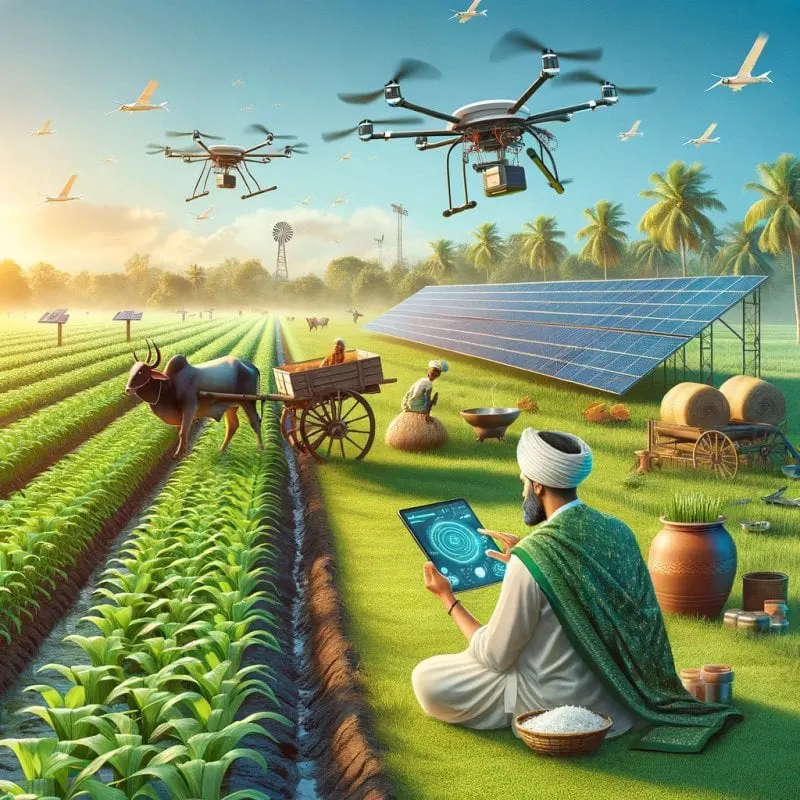AI can play a crucial role in making agrifood more resilient but could lead to increased carbon emissions
AI can play a crucial role in making agrifood more resilient but could lead to increased carbon emissions
et al., Mehran Ghasemlou | AgTechNavigator | May 19, 2025
XLinkedInFacebookRedditBlueskyThreads


Artificial intelligence (AI) and machine learning (ML) technologies are offering powerful tools to transform the agrifood system, and new research reveals some of the best opportunities to slash waste, boost crops and enhance shelf life.
Global food demand is expected to jump by 35% to 56% by 2050, but current food production methods have proven unsustainable. Agriculture today consumes about 72% of the world’s freshwater supply and has caused a fivefold rise in fossil fuel use for machinery over the past decades. Meanwhile, almost one-third of the food produced globally is lost or wasted, even as more than 820 million people live with hunger.
Follow the latest news and policy debates on sustainable agriculture, biomedicine, and other ‘disruptive’ innovations. Subscribe to our newsletter.
Despite its promise, however, AI brings new risks the food industry must not ignore. Training AI models and running massive datasets require substantial energy, much of which still comes from non-renewable sources like coal and natural gas. This means the very tools designed to make agriculture more sustainable could end up increasing carbon emissions if their energy use is not managed.
This is an excerpt. Read the original post here
XLinkedInFacebookRedditBlueskyThreads

 | Videos | More... |

Video: Nuclear energy will destroy us? Global warming is an existential threat? Chemicals are massacring bees? Donate to the Green Industrial Complex!
 | Bees & Pollinators | More... |

GLP podcast: Science journalism is a mess. Here’s how to fix it

Mosquito massacre: Can we safely tackle malaria with a CRISPR gene drive?

Are we facing an ‘Insect Apocalypse’ caused by ‘intensive, industrial’ farming and agricultural chemicals? The media say yes; Science says ‘no’
 | Infographics | More... |

Infographic: Global regulatory and health research agencies on whether glyphosate causes cancer
Does glyphosate—the world's most heavily-used herbicide—pose serious harm to humans? Is it carcinogenic? Those issues are of both legal and ...
 | GMO FAQs | More... |

Why is there controversy over GMO foods but not GMO drugs?
Genetic Literacy Project

How are GMOs labeled around the world?
Genetic Literacy Project

How does genetic engineering differ from conventional breeding?
Genetic Literacy Project
 | GLP Profiles | More... |

Alex Jones: Right-wing conspiracy theorist stokes fear of GMOs, pesticides to sell ‘health supplements’




 A single high dose of LSD can ease anxiety and depression for months
A single high dose of LSD can ease anxiety and depression for months From plastic coasters to human hearts: Inside the race to print the human body
From plastic coasters to human hearts: Inside the race to print the human body CRISPR pork: U.S. approves first gene-edited pigs for consumption
CRISPR pork: U.S. approves first gene-edited pigs for consumption ‘SuperAgers’: Why some people have the brains and memory capacity of people decades younger
‘SuperAgers’: Why some people have the brains and memory capacity of people decades younger  Baby food panic, brought to you by trial lawyers hoping to prosecute by press release
Baby food panic, brought to you by trial lawyers hoping to prosecute by press release From ‘Frankenfood’ to superfood: Can the purple tomato overcome GMO myths to win over consumers?
From ‘Frankenfood’ to superfood: Can the purple tomato overcome GMO myths to win over consumers? Viewpoint: Life and death decisions: RFK, Jr.’s shady FDA “expert panels” operate in secret with no transcripts or conflict of interest reviews
Viewpoint: Life and death decisions: RFK, Jr.’s shady FDA “expert panels” operate in secret with no transcripts or conflict of interest reviews When farmers deny science: The hypocrisy hurting agriculture’s credibility
When farmers deny science: The hypocrisy hurting agriculture’s credibility
